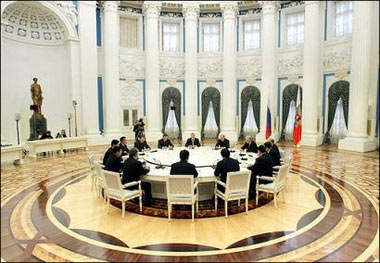Russia and China moved to fortify their growing security cooperation in
Central Asia but reassured the United States that their new-found unity of
purpose in the region was not designed to subvert US interests there.

Chairmen of the Parliaments of
the Shanghai Cooperation Organization (SCO) Member States meet with
Russian President Vladimir Putin in Moscow's Kremlin. Russia and China
moved to fortify their growing security cooperation in Central Asia but
reassured the United States that their new-found unity of purpose in the
region was not designed to subvert US interests
there.[AFP] |
Russian President Vladimir Putin however acknowledged growing "competition"
to a new Central Asian security organization led by Moscow and Beijing while
Chinese President Hu Jintao said the new group had become an "important force"
for peace and stability in the world.
In the first meeting of its kind, parliamentary leaders from the six
countries of the Shanghai Cooperation Organization (SCO) met Tuesday in Moscow
to discuss ways to harmonize their laws and begin building a legislative
dimension for the grouping.
The SCO parliamentary leaders, including Wu Bangguo, chairman of the standing
committee of the Chinese legislature, held a meeting at the Kremlin with Putin,
who said involvement of national legislatures in the organization would "enrich
the partnership" of its member states.
Led by China and Russia, the SCO, founded five years ago, also includes
Kazakhstan, Uzbekistan, Kyrgyzstan and Tajikistan. Other key countries in the
region -- India, Iran, Mongolia and Pakistan -- currently have observer status
and have also expressed interest in becoming full members.
The United States however is not a member and, according to sources, is
growing increasingly uneasy at the direction and purpose of the organization,
which has been described by experts as the foundation of a new Eurasian
counterweight to the North Atlantic Treaty Organization ( NATO).
One source who asked not to named said the US embassy in Beijing earlier this
month delivered a message to the SCO secretariat voicing concern that some
members may regard the group as a vehicle for countering US influence in the
region. This could not immediately be confirmed in Moscow.
In his meeting with the lawmakers, Putin said there was growing international
interest in the SCO which he said "has become an important, influential regional
organization" in the five years since its founding.
He also cited efforts to counter this growing influence.
"We see in the international arena there are attempts to create competition
to our organization," Putin said.
"I think it would be right if we did not engage in this and instead continued
with the positive, constructive work that we have been doing for the past
several years."
Putin did not refer to the United States explicitly but Boris Gryzlov, the
speaker of the Russian parliament, made clear afterwards that Moscow had
Washington foremost in its mind.
"Is it possible to fight terrorism and drug trafficking in the region without
the participation of the states of the region? Of course not," Gryzlov said in
remarks broadcast on state television.
"But a proposal to create in Central Asia an organization parallel to the
SCO, which the United States has called for, suggest that this can be done. This
does not help the fight against threats. It only makes the threats bigger."
Gryzlov did not elaborate, but reports in Russian and Chinese media in recent
months have evoked a "big Central Asia" initiative, described as a US plan to
set up a new grouping of Central Asian states -- excluding Russia and China --
to coordinate work in various fields.
A report in the Russian government daily Rossiiskaya Gazeta on May 13
speculated that even Iran could be asked to participate in the new US-inspired
grouping.
Russian Deputy Foreign Minister Alexander Alekseyev however said Tuesday that
Iranian President Mahmoud Ahmadinejad was among the leaders who had confirmed
his attendance at an SCO summit scheduled to be held in Shanghai next month,
ITAR-TASS news agency said.
Meanwhile, speaking in Beijing, the Chinese president sought to reassure
Washington that the SCO was not aimed at subverting US interests in Central
Asia.
"Since its founding, the Shanghai Cooperation Organization has not been a
close, exclusive organization," Hu said in remarks carried on Chinese state
television.
"It is aimed against no country whatsoever," he said, adding that the
organization had become "an important force for promoting peace and stability in
the region and throughout the world."